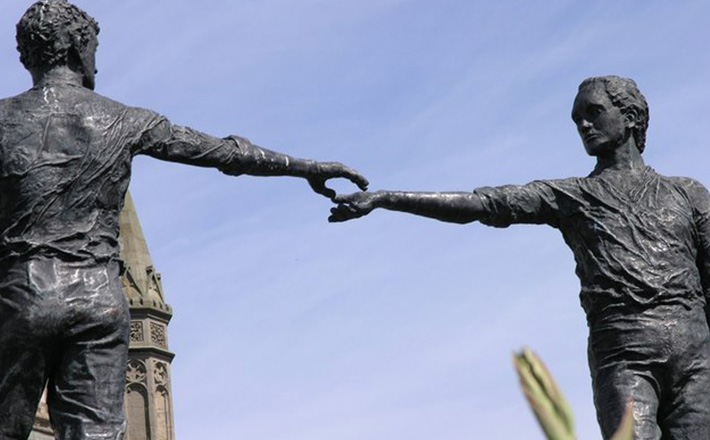Commentary on Matthew 5:21-37
Who you are as a disciple is not just about you, but about you as a disciple in community.
Discipleship in community
This next section of the Sermon on the Mount begins to turn the perspective of the disciples outside of themselves. They are not disciples for their own sakes, and their own actions, but for the sake of those around them as well. There is an accountability, a responsibility to the other for the sake of good of the community.
We know that when we preach a part of a Gospel we are always preaching the whole. This should not only be a corrective to our interpretations but also a help. It is in Matthew that Jesus says, “where two or three are gathered in my name, there I am also” (Matthew 18:20). Nothing we do as disciples, as believers, is an autonomous action. It has an effect on those around us. And when we remember there are others around us, perhaps then our actions might very well be shaped by that answerability.
To be accountable to a community puts some checks and balances in place when it comes to being a disciple—and when it comes to being a leader in the church. All too often, we witness leadership in the church that seems oblivious to the fact that the shaping of a community is at stake. Leaders in the church make decisions as if no one is watching, no one cares, or that the decisions do not matter in and for the lives of others.
Do you have some examples of this truth that come to mind? Do you have some memories of when you might have done the same? It is never pleasant to contemplate your own leadership, but it is ever so necessary. Those moments when we made decisions without others in view. Those moments when we think that what we decide is only of our own accord. Those moments when we forget that the Kingdom of Heaven might very well rely on our willingness to think outside of ourselves.
This is a moment to preach that the actions of your individual faith actually matter for the individuals sitting next to you in the church pew every Sunday. That what you do during the week might reflect on or give witness to your fellow parishioner. That who you choose to be in the world is not only a revelation of yourself, but also a manifestation of those with whom you are in relationship or claim connection. When we start thinking and understanding that our actions not only reveal who we are but also the communities of which we are a part, we begin to feel the weight of what it means to be a member of a community—and we should.
At the same time—and here is the promise of this text—to be a part of a community means you are not alone. The disciples needed to hear this truth. How they work out what it means to be disciples of Jesus is not a solitary affair, but can and should happen within a community of the faithful. There is no way that what they do, what Jesus will ask them to do, can reach its full potential without the realization of the company and the community of the faithful with you and beside you. Furthermore, once you realize that your potential as a disciple, who you can be as a disciple, is not just dependent upon you but helped by another, it is then that you begin to believe it.
Lest we think this is obvious, this is a very challenging truth to preach. Our world favors and rewards individualism, autonomy, and independence. To preach the necessity of connectedness, community, and dependence will not be a popular message. We will need to be prepared for questioning and resistance, or even a flat out rejection of Jesus’ demands. Why? Because they go against what the world favors and values.
Going against the world’s criteria for success is never a loved message. But sometimes, such is the nature of preaching and perhaps this is why Jesus’ first act in Matthew had to be a sermon—a prophetic sermon. A sermon that was willing to tell the truth about ourselves, about discipleship, about God, and about what is really at stake because Jesus is Emmanuel.
A claim easily sloughed off. A conviction readily set aside. A confession regularly deemed as utopian. Yet, at the heart of the Sermon on the Mount, in fact, the only way that this sermon could be preached, is the premise of Jesus as Emmanuel. When we remember that God is with us, not just that God is with me, we begin to realize we are not simply members of community but shapers of community and are shaped by community, all of which tells a critical theological truth—our God is a God of community.


February 12, 2017